- Home
- Leslie Meier
Irish Parade Murder Page 15
Irish Parade Murder Read online
Page 15
“Well, I just want to say I’m really sorry for your loss,” she began, feeling her way, in hopes of getting Rosemary’s reaction to the elaborate funeral plans. “I know that Sheriff Murphy is planning an official departmental funeral, and I could use some information . . .”
Rosemary stopped suddenly, and Lucy narrowly avoided crashing into her. “Believe me, I don’t have anything to say about that bastard or the sheriff’s dog-and-pony show that’s fit to print—and that’s off the record.” Then she was off again, marching down the sidewalk toward Jake’s Donut Shack.
“Maybe we could have a little chat over a cup of coffee. . .” suggested Lucy, trotting alongside her. “I know I could use one.”
“Thanks, but no thanks.” Rosemary didn’t make eye contact. “Go talk to his mother; she’s the one who thinks her darling boyo could do no wrong. I’d bet she’d love to talk about him—and boy, does she love bagpipe music and men in uniform.”
“Okay,” said Lucy, who was becoming breathless from the effort of keeping up with Rosemary, who was surprisingly quick for such a large woman. “Thanks for the tip.”
Rosemary snorted. “Don’t bother to thank me. I warn you, that woman is a piece of work.” Then she hopped up the steps to Jake’s and yanked open the door, disappearing inside.
Lucy considered following her, but decided against it. She’d given it her best effort, but Rosemary didn’t want to talk. She remembered how she’d been unavailable immediately following Gabe’s death and wondered if she was under some sort of mandate from the sheriff to avoid the media. If so, it seemed likely that Gabe’s mother would also be off-limits, but she figured it was worth a try.
Back in the car, she consulted an old printed telephone book, which she’d found was the quickest way to locate people who’d been living in the county before everybody got cell phones and the phone company stopped issuing the directories. Sure enough, there were a number of Mc-Gourts, but M. C. seemed the likeliest, as she knew women who lived alone often listed themselves with only their initials. She suspected M.C. stood for Mary Catherine, which was a popular name among Irish-Catholics in Gabe’s mother’s generation. The address wasn’t far, about ten minutes away, and it was still early, so she decided to take a chance and drop in unannounced.
The house, as she expected, was as neat as a pin. A white picket fence enclosed a neat patch of brown lawn, and a clump of snowdrops was blooming next to the doorstep. The front door had been freshly painted, and spotless white curtains hung in the windows, which appeared to have been newly washed; Mary Catherine apparently believed in getting her spring cleaning done early. As she prepared to ring the bell, it occurred to Lucy that she didn’t do any spring cleaning last year and probably wouldn’t this year, either, considering the way things were going. Come to think of it, as she pressed the doorbell button, she doubted anybody under the age of sixty bothered with such a thing anymore.
There was no immediate answer to the ring, and Lucy hesitated to ring a second time. She knew Mary Catherine might well be coping with arthritis or other issues of aging, as well as grief, and decided to wait a bit to give her time to get to the door. Sure enough, just as she was about to leave, the door opened, revealing a tiny woman with snowy-white hair and bright blue eyes. “Good day to you,” she said, with an expectant expression. “How can I help you?”
Lucy hadn’t really expected such a pleasant greeting and stammered a bit, identifying herself.
“From the paper? My goodness. It must be about my poor boy. Well, why don’t you come in, and I’ll tell you all about him.”
“That’s very kind of you,” said Lucy, entering the hallway, where she was immediately confronted with a large crucifix, with a dried palm leaf tucked behind it, that hung on the wall.
“Let’s go into the parlor,” invited Mary Catherine, leading the way into a rather modestly sized front room that was comfortably furnished with a small sofa, a coffee table, and a corduroy-covered recliner. The sofa and recliner were lavishly provided with scatter pillows, and plates picturing JFK and Jackie hung on one wall; a photo of Pope John Paul II beamed at them approvingly from the opposite wall.
“Do sit down,” invited Mary Catherine. “Can I get you a cup of tea?”
“Oh, no, thank you. I only want a few moments of your time,” said Lucy, smiling and producing her notebook. “I know this is a difficult time for you, and I am so very sorry for your loss.”
“Thank you.” The old woman paused for a moment, gazing at a small statue of the Virgin Mary that stood on a side table. “It’s times like this when a strong faith is such a support. As much as I miss my boy, I know he’s in a better place, up there with his father and little brother, Michael. They’re waiting for me, and soon, I hope, the good Lord willing, I’ll be joining them.”
Lucy nodded along, amazed at this woman’s sincere conviction, which she couldn’t quite share. “What can you tell me about your son, about Gabe?”
“Well, he was a dear boy. We named him after an angel, you know, and it was a prophetic choice, because he never got in trouble, never gave us a moment’s worry or concern. He was a wonderful father, he loved his kids, and it’s really too bad about the divorce, but I wouldn’t want to say a bad word about Rosemary. He did marry out of the faith, but that doesn’t really matter because in the eyes of the Lord they’re still married, even if Rosemary doesn’t think so.”
“Did they have joint custody of the boys?” asked Lucy. “Did he spend a lot of time with them?”
“Oh, yes. And he’d bring them here, and I’d make sure I had some of their favorite cookies and videos. They loved sleeping over”—she paused, eyes twinkling naughtily, and added—“because I’d let them stay up a bit late.”
“I suppose he played ball with them, took them to the playground?”
“Oh, yes. But, of course, he often had to work weekends or nights, and what with the alimony and child support, he could only afford a small studio apartment, so it was better if the boys came here with me. It was like reliving the days when I had my own boys, and I was always cooking and caring for them.” She picked up a framed photograph from a side table that pictured a small boy in a white suit. “This is Justin at his First Communion. Doesn’t he just look so proud? That was a few years ago; now we’re getting Johnny ready for his First Communion.”
Lucy wondered if Rosemary, who she occasionally saw at the Protestant Community Church, approved of all this emphasis on Catholicism. Or maybe, she thought, she appreciated having some time to herself that she could spend at the gym.
“It’s a rare young man who doesn’t get involved in some scrape or other,” began Lucy, probing gently for more information about Gabe.
“Well, it’s a shame those boys lost their Daddy,” replied Mary Catherine, misunderstanding the question. She clucked her tongue. “They’ll be just fine, though. Gabe had lots of friends, and they’ve promised to look out for his boys. Even the sheriff himself told me that he would be keeping an eye on them, making sure they stayed on the straight-and-narrow path.”
“I’m sure that’s a great comfort to you,” said Lucy, wondering if Gabe’s mother had truly misunderstood or simply wanted to change the subject. It seemed she would have to be more direct in her questioning. “After the divorce, was Gabe interested in dating? Was he seeing anyone in particular?”
“Not that I know of. Like I said, he only got divorced because Rosemary demanded it. He was a good Catholic and knew they were married for all eternity.”
“Even so, he might have had some female friends,” suggested Lucy. “I believe he was involved with a woman named Melanie?”
“That is nothing but a vile, nasty rumor,” snapped Mary Catherine, her eyes blazing. She stood right up, quivering with rage. “I think . . . I’ve just remembered . . . I have to see the priest about the funeral. I can’t be late; he’ll be expecting me.”
“Of course,” said Lucy, closing her notebook and getting to her feet. “I certainly und
erstand, and I am grateful for your time.”
Mary Catherine’s face was stony; she was clearly struggling to maintain a polite façade as she opened the front door. “Have a nice day now,” she said, glaring, as she yanked open the door.
Must have touched a nerve, thought Lucy, making her way down the path to the front gate. Mary Catherine was certainly not going to admit that her son was anything less than an angel, no matter what the truth might be.
Her phone rang when she reached her car, and she answered as she slid behind the wheel. It was Ted, calling from the courthouse. “So how did it go?”
“Fast, very fast. Over before it started.”
That didn’t sound good. “So no bail?”
“No bail.”
“Did they set a trial date?”
“Not yet. The legal team from the TRUTH Project barely made the arraignment; they arrived just as court went into session. They did get a date for a pre-trial conference.”
Lucy started her car. “Was the media coverage crazy?”
“Not too bad, actually. Boston and Portland papers were there, and two Boston TV stations, but that was it. The story hasn’t gone national yet.”
“I bet the sheriff was disappointed . . .”
“Yeah.” Ted chuckled. “There were actually more cops and deputies than reporters.”
Lucy shifted into gear and pulled out into the road. “How did Rob look? Is he holding up?”
Ted didn’t answer right away. “He looked kind of lost,” he finally said. “I was surprised. I thought he was this big-shot investigative reporter, the sort of guy who’s prepared to pay the price for challenging the powers that be.” He sighed. “He looked really anxious until the lawyers arrived.”
“That’s just natural,” suggested Lucy, zipping along the road. “It’s one thing to get arrested for refusing to reveal your sources, and quite another to be accused of murder.”
A couple of harsh squawks shattered the quiet, and she checked her rear-view mirror, spotting flashing blue lights. “Darn. Now it’s my turn to be harassed.” She immediately put on her turn signal and pulled off to the side of the road.
“Keep your hands visible and be polite,” advised Ted, “and keep your phone on.”
Lucy braked and waited, watching as the Gilead cop approached her car.
“Do you have any idea why I stopped you?” asked the officer, a middle-aged guy with an amused twinkle in his eye.
“No, officer,” said Lucy, in a very little voice. She had her suspicions: she had been talking on her cell phone for one thing; speeding also came to mind, as she really hadn’t been paying attention to the posted limit. And then there was always the potential for harassment when her job put her at odds with the police.
“Your inspection sticker is out of date,” he said.
A quick glance at the sticker on her front windshield revealed that it was three months overdue. “It sure is,” admitted Lucy. “I’ll take care of it right away.”
The officer tipped his hat. “Good. Make sure you do.”
Lucy couldn’t believe she wasn’t going to get a ticket. “Can I go?” she asked.
“Yes. Have a nice day.”
“You, too, officer,” she replied. Letting out a sigh of relief, she watched him walk back to his cruiser. When he was safely inside, she flicked on her signal and pulled out onto the road.
“That was unexpected,” came Ted’s voice from the phone, which she’d forgotten about.
“Yeah,” said Lucy. “See you in the office.”
“After you get that car inspected,” reminded Ted.
“Right, boss.” She couldn’t believe it had slipped her mind so soon. She was definitely dealing with too much stuff. “I’ll go straight to the garage.”
Chapter Fourteen
Lucy had a surprisingly expensive new set of windshield wipers and a fresh bright inspection sticker on her car when she drove to the airport in Portland a few days later to pick up Edna; Bill was tied up presenting an application to replace a defunct gas station with a three-unit condo at a planning committee meeting. While she negotiated busy Route 1 and the confusing highways around the city, her thoughts turned to Mary Catherine, who seemed stuck in the past by refusing to acknowledge her son’s shortcomings. These days, women no longer turned a blind eye to their menfolk’s bad behavior, but instead called it out. Every day it seemed that another high-powered, successful man was accused of sexual assault and hauled into court to face the women he had abused. Women no longer cowered in dark corners, ashamed to speak up when they were abused, but bravely recounted episodes of mauling, unwanted sexual advances, and even rape. Rape, it turned out, was a lot more common than Lucy had realized, and it occurred in unlikely places, such as the dressing rooms of fancy department stores, business offices, and conference rooms.
But even though there had been a huge change in attitudes toward sexual aggression, it seemed that a deceived wife still had to pay a price for her husband’s infidelity. Simply sending a perpetrator to jail didn’t help the wife, who had to endure public embarrassment as well as financial hardship due to the loss of her husband’s income. It was one thing if your wandering husband was a top executive earning millions, but quite another if he was a teacher or a store manager and you lived paycheck to paycheck. There was no protection for these women, who might very well have had no idea what their spouses were up to.
That was the situation for Edna, who was left with the unenviable task of cleaning up the mess her husband had bequeathed her by dying intestate, a situation complicated by the arrival of a possible heir. Lucy couldn’t quite believe that Bill Sr. hadn’t made arrangements to take care of Edna after his death, but then she couldn’t believe he’d been unfaithful, either. The old fellow had apparently been full of surprises, and not good surprises. Finally reaching the airport and parking the car, Lucy made a silent vow to be present for Edna, to listen to her concerns, and to offer support. What she didn’t want to do was to argue or be confrontational, which she knew she had a tendency to do when she didn’t agree with someone. Unfortunately, she had a feeling that she wasn’t going to like what Edna had to say about Kate Klein, but she was determined to keep her emotions in check. The last thing Edna needed at this time was an argument. Given unstinted love and support, Edna would hopefully come to the right conclusion on her own.
The flight was delayed, of course, and Edna was apologetic about her late arrival and became increasingly agitated as the baggage carousel went round and round with no sign of her suitcase. When it finally appeared, the very last bit of luggage coming through the flap after an anxiety-producing gap, she was almost in tears.
“There, there,” cooed Lucy, giving her a hug. “No reason to get upset. Even if it was lost, we can get you everything you need. No problem at all. I’m just so glad you came.”
“Oh, Lucy, that’s so sweet of you.” Edna blinked a few times. “Where’s Bill? Why didn’t he come?”
“He wanted to come, but he has an important meeting to get approval for a condo development he hopes to build.” Lucy tried to soften the blow by saying, “He’ll probably be waiting for us when we get home. I know he’s eager to see you.”
“I see,” said Edna, in a rather cool tone. “I certainly don’t want to be an inconvenience,” she added, grabbing her suitcase away from Lucy. “That’s the last thing I want. You should have let me take the bus; there was really no need for you to come all this way and wait around to meet me. I can manage perfectly well on my own, you know.”
“I was happy to do it,” said Lucy, beginning to feel that her effort to give Edna a warm welcome was rather unappreciated as they made their way out of the terminal. “You’ve come all the way from Florida; making you take the bus was out of the question.”
“I could have rented a car, you know. Then you wouldn’t have needed to pick me up.”
“We have cars, four cars; you don’t need to rent one. And it’s my pleasure to meet you and make you c
omfortable.” They were at the curb, and Edna was struggling with her roller suitcase as well as her purse and carry-on bag. “Let me take something,” begged Lucy, who was embarrassed to be seen unencumbered alongside this overburdened elderly woman.
“Well, if you insist, you can take the carry-on,” said Edna, handing over a brightly colored, quilted duffel. “But I can manage perfectly well.”
“I insist,” said Lucy, looping the carry-on over her shoulder. “The car’s this way.”
The light was fading as they walked through the parking lot, and it was dark by the time they had stowed the luggage and seated themselves in the car. “Well, Lucy,” began Edna, as Lucy started the car, “I don’t have to tell you that it is a great relief to be here. I thought for a time they were going to cancel my flight, and that would have been a disaster.”
“How so?” asked Lucy, shoving the ticket in the machine and following up with her credit card.
“Because I’m meeting Kate Klein tomorrow,” said Edna, as the striped wooden barrier rose and Lucy exited the parking lot.
“You are?” inquired Lucy, thinking this was news to her.
“Yes. And I’m hoping the whole family will meet her. You and Bill and the girls, we can show her photos of Toby and his family and Elizabeth, too. I know Kate wants to know all about us.”
“I’m sure she does,” said Lucy. “When and where is this meeting supposed to take place?”
“At the house, of course,” said Edna. “Where else?”
“My house?” Lucy was flummoxed. “When exactly is this supposed to happen?”
“I thought lunch would be nice.” Edna had folded her hands on her purse, which was on her lap, and was looking out the window. “It’s a shame it’s so dark and I can’t see the view. I love those first glimpses of the coves, the blue water, the marsh grass, and the pine trees.”
“Edna, I wish you’d told me about Kate, so I could have planned something. I don’t know if Bill can take off work, or what the girls are doing tomorrow.”

 Christmas Card Murder
Christmas Card Murder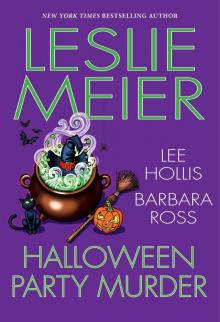 Halloween Party Murder
Halloween Party Murder 'Tis the Season Murder
'Tis the Season Murder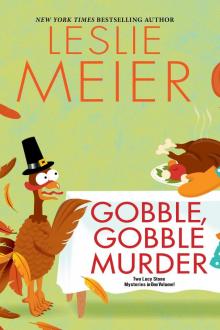 Gobble, Gobble Murder
Gobble, Gobble Murder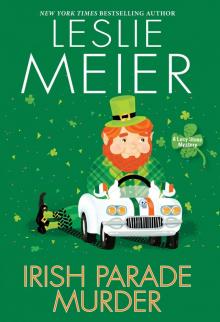 Irish Parade Murder
Irish Parade Murder Bake Sale Murder
Bake Sale Murder Haunted House Murder
Haunted House Murder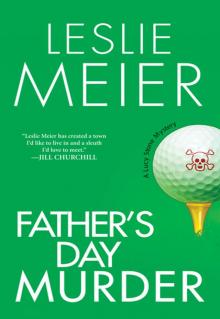 Father’s Day Murder
Father’s Day Murder Chocolate Covered Murder
Chocolate Covered Murder Tippy Toe Murder
Tippy Toe Murder Turkey Trot Murder
Turkey Trot Murder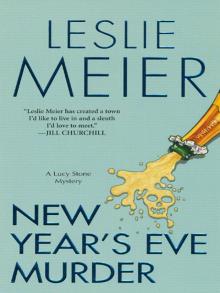 New Year's Eve Murder
New Year's Eve Murder Candy Corn Murder
Candy Corn Murder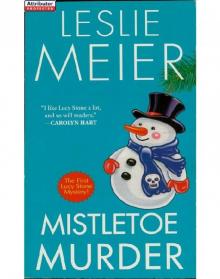 Mistletoe Murder
Mistletoe Murder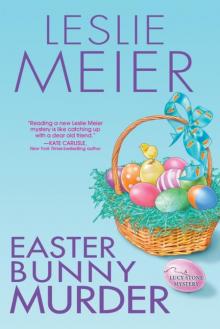 LStone 20 - Easter Bunny Murder
LStone 20 - Easter Bunny Murder Mother's Day Murder
Mother's Day Murder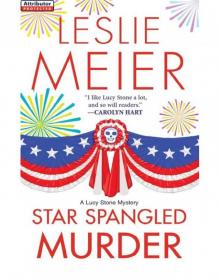 Star Spangled Murder
Star Spangled Murder Silver Anniversary Murder
Silver Anniversary Murder Wicked Witch Murder
Wicked Witch Murder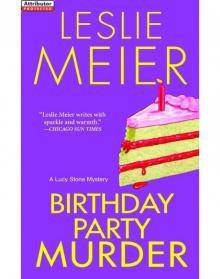 Birthday Party Murder
Birthday Party Murder Wedding Day Murder
Wedding Day Murder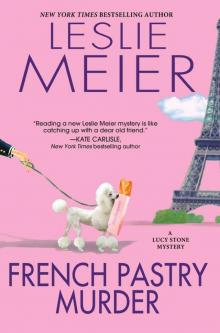 French Pastry Murder
French Pastry Murder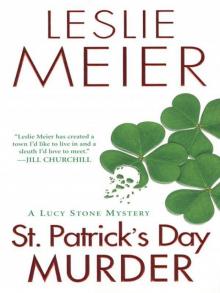 St. Patrick's Day Murder
St. Patrick's Day Murder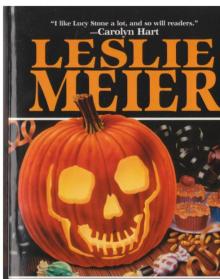 Trick or Treat Murder
Trick or Treat Murder Yule Log Murder
Yule Log Murder Holiday Murder
Holiday Murder British Manor Murder
British Manor Murder English Tea Murder
English Tea Murder